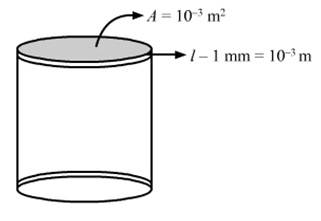Water at 50°C is filled in a closed cylindrical vessel of height 10 cm and cross-sectional area 10 cm2. The walls of the vessel are adiabatic but the flat parts are made of 1 mm thick aluminium (K = 200 J s–1 m–1 °C–1). Assume that the outside temperature is 20°C. The density of water is 1000 kg m–3, and the specific heat capacity of water = 4200 J k–1 m–1 °C–1. Estimate the time taken for the temperature to fall by 1.0°C. Make any simplifying assumptions you need but specify them.
Given:
Temperature of the water : T1 = 50 °C
Height of the vessel : h = 10 cm = 0.1 m
Cross section area of the vessel: A = 10 cm2 = 0.001 m2.
Thickness of the flat parts: x = 1mm = 0.001 m
Thermal conductivity of the aluminium: K =200 J s–1 m–1 °C–1
Temperature outside: T2 = 20 °C
Density of water : ρ = 1000 kg m-3
The specific heat capacity of water = 4200 J k–1 m–1 °C–1.
Since the walls are adiabatic, no heat transfer would take place. Hence the heat would be transferred only via flat surfaces which are Up and Bottom surfaces.
Formula used:
Rate of amount of heat flowing is given as:![]()
Here, Δθ is the amount of heat transferred, ΔT is the temperature difference, K is the thermal conductivity of the material, A is the area of cross section of the material and x is the thickness of the material.
Rate of flow of heat from both the flat surfaces would be:![]()
![]()
![]()
Hence, rate of heat flow from both the flat surfaces is 12000 J/s.
We know that,
ΔQ=Δθ = msΔT
![]()
Where, ΔQ is the change in heat energy, m is the mass , s is the specific heat of the substance and ΔT is the change in temperature for the substance.
Also,
Mass = Density × Volume
∴ m = 1000 × 0.001× 0.1
∴ m = 0.1 kg
We need to find time taken for the temperature to fall by 1°C
Thus, ΔT = 1°C
Substituting in equation (2) and using (1) we get,![]()
![]()
![]()
Hence, it took around 0.035 seconds for the temperature to drop by 1°C.